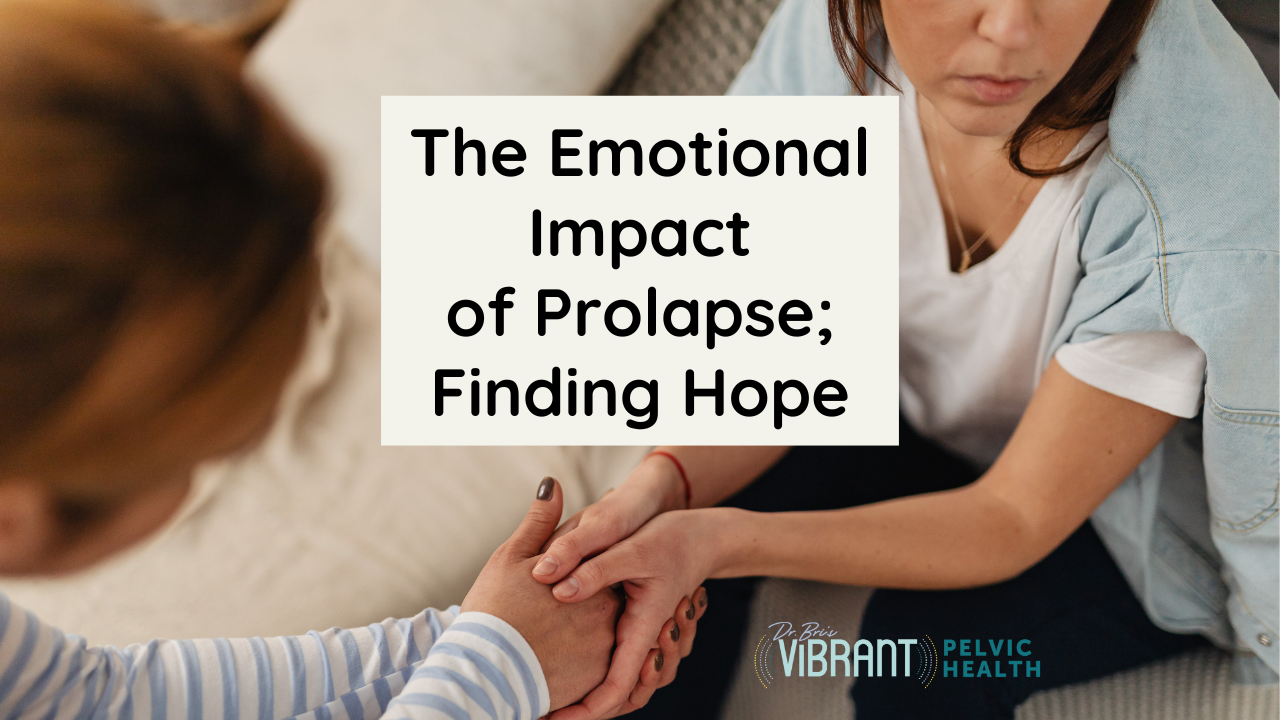Finding Hope After Prolapse

My personal story: Three weeks after giving birth, I made a mistake that changed my life. Emotional, exhausted, and craving my “normal” (pre-baby) routine, I went for a run even though it was WAY too early for my body to handle the strain of high-impact exercise. About half a mile into my run, I felt something drop in my pelvic area. In that instant, I developed a mild bladder prolapse, and my life was never the same.
But keep reading, because there is help for prolapse. YES, you CAN reverse symptoms! Don’t give up hope!
Often women have never even heard of prolapse until they realize that "things feel different down there.” Developing prolapse is very common. What is alarming is the lack of awareness about this common concern, the inadequate education and support for women, and the limited dialogue between healthcare professionals and their patients. Pelvic health is still a taboo subject, and it’s abhorrent that pelvic floor care is not given to most new mothers after their 6-week postpartum check. Women all over the world suffer for YEARS — even their whole adult life — with bladder leakage or pelvic organ prolapse. This should not be the case. You need support physically and emotionally to live a confident lifestyle with pelvic health concerns like prolapse.
What is prolapse?
Sign up for my free prolapse guide HERE to learn more, and keep reading for a summary!
Pelvic organ prolapse is a shift in the position of one or more pelvic organs.
It can be due to dysfunctional patterns of muscular tension and/or laxity in the tissues, long-standing alignment issues, myofascial restrictions, adhesions, scar tissue, and problems with intra-abdominal pressure management. Any of these concerns can cause (and/or perpetuate) pelvic organ shifts.

What are the symptoms?
Prolapse includes symptoms that impact both the mind and the body. Excess muscular tension can occur because of a desire to grip and "hold in" the shifted organs, to "hold in" urine (if bladder leakage is a concern), and due to anxiety and emotional strain.
Physical issues for women with prolapse:
-
feeling heaviness in the pelvis or like something is "stuck" in the vagina
-
GI issues, troubles with constipation or difficulty having a BM
-
urinary urgency or frequency, sometimes bladder leakage
-
back and/or pelvic pain, and fatigue by the end of the day especially
These physical changes have a detrimental impact on a woman’s emotional state. Here's a video that explains:
Many women with prolapse feel like something is wrong with them; they feel "broken" and helpless. They're afraid to move and exercise because they're worried they'll make the prolapse worse, and they feel anxious and uncertain about their future.
Will they need surgery?
Will they ever feel normal again?
Can they have sex?
Will they be able to be active again?
This fear, uncertainty, and anxiety can lead to a depletion of energy, a depressed mood, and a reflexive clenching or gripping in the belly, butt, and pelvic floor muscles... which typically makes symptoms feel worse.
The great news is that it is never too late to work on your prolapse, and there are things you can do to help! I can help you begin to relax, heal, and gradually strengthen your muscles, reducing (and sometimes even reversing) symptoms of prolapse. Ultimately, you CAN get back your confidence and learn to live a prolapse-friendly lifestyle that allows you to feel comfortable, vibrant, and strong.
If you have prolapse, just know that there is hope, and there is help for MIND AND BODY symptom relief. Some people even find that their issues no longer bother them (or are noticeable at all) after completing my Lift program and/or a course of pelvic health physical therapy. You don't have to go through this alone. Join my Lift program and get ready to FEEL BETTER!
Reverse your prolapse symptoms!
Before I found Lift, I was advised to only stand or walk for 45 minutes at a time (as well as the usual no high-impact exercise, no lifting), so I developed a real fear of movement & developed quite debilitating lower back & hip pain. I was worried I would have to find a new job because of that advice. But after going through your program I’ve seen so many gains. Now I can easily lift my son out of the bath, carry him from his bed to mine in the middle of the night if need be, and I can even carry him from nursery to the car (about a 10-minute stroll). All without fear of movement since I am stronger and now know the right techniques. My prolapses were really beginning to change how I was as a parent, and how I felt about myself. Now thanks to your movement sessions, lifted lifestyle tips and your positive, inspiring, holistic approach to pelvic health I am so much stronger and feel so much more connected to my body. You really have given me my life back.
~Sharon Oakley, York, England
Get Lift today... you can try the first week for free!
Does your pelvic floor need help?
Many women think they just need live with the changes they’re experiencing
“down there,” but this is NOT the case. Take the short quiz to find out if you have issues that can be solved naturally.







